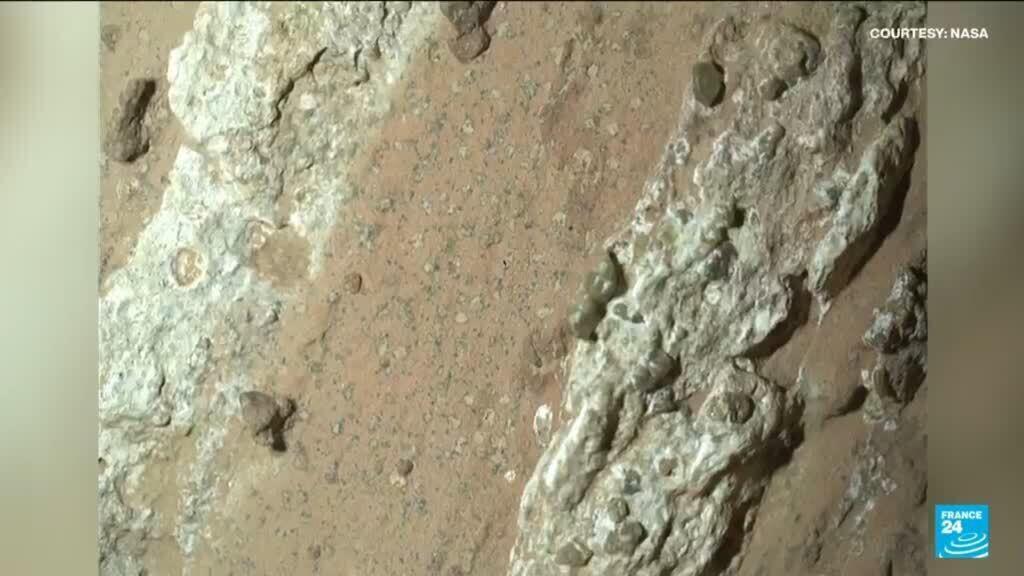Science
NASA’s Perseverance Rover Discovers Potential Signs of Life on Mars

NASA’s Mars rover Perseverance has made a significant discovery, unearthing rocks in a dry river channel that may offer clues about ancient microscopic life. Scientists announced these findings on Wednesday, March 13, 2024, emphasizing the need for comprehensive analysis of the samples collected. They suggest that further examination should ideally take place in laboratories on Earth to draw any definitive conclusions.
Research teams are particularly interested in the composition of the rocks, which are believed to have formed in the presence of water. The discovery comes as part of Perseverance’s ongoing mission to explore Mars’ Jezero Crater, an area that scientists believe was once covered by a lake. This context bolsters the potential for past life, as water is a critical ingredient for life as we know it.
Significance of the Findings
The rocks found by Perseverance contain materials that may have preserved biological signatures from billions of years ago. According to NASA scientists, these geological features warrant further investigation to determine if they indeed contain remnants of ancient life. The rover has been equipped with advanced instruments designed to analyze rock samples in situ, but the complexities of confirming life necessitate a more controlled environment.
While the presence of ancient life remains unproven, the discovery underscores the importance of continued exploration and study of Mars. The findings align with previous research suggesting that life may have existed on the planet when conditions were more hospitable.
Next Steps for Research
Following this discovery, the next phase involves a detailed examination of the collected samples. NASA has plans to return samples to Earth through future missions, allowing scientists to conduct in-depth analyses using sophisticated laboratory techniques. This process could take years, but it holds the promise of answering critical questions about the potential for life beyond Earth.
The excitement surrounding these findings reflects a broader interest in Mars exploration. As technology evolves, missions like Perseverance pave the way for more advanced studies of the Red Planet. The quest for understanding Mars not only fuels scientific curiosity but also expands our knowledge of the universe and the conditions necessary for life.
In summary, while the findings from Perseverance are promising, they represent just the beginning of a potentially groundbreaking journey into the history of Mars. The scientific community eagerly anticipates the results of ongoing analyses, which may one day reveal whether Mars hosted life in its ancient past.
-

 Science2 months ago
Science2 months agoToyoake City Proposes Daily Two-Hour Smartphone Use Limit
-

 Health2 months ago
Health2 months agoB.C. Review Reveals Urgent Need for Rare-Disease Drug Reforms
-

 Top Stories2 months ago
Top Stories2 months agoPedestrian Fatally Injured in Esquimalt Collision on August 14
-

 Technology2 months ago
Technology2 months agoDark Adventure Game “Bye Sweet Carole” Set for October Release
-

 World2 months ago
World2 months agoJimmy Lai’s Defense Challenges Charges Under National Security Law
-

 Technology2 months ago
Technology2 months agoKonami Revives Iconic Metal Gear Solid Delta Ahead of Release
-

 Technology2 months ago
Technology2 months agoSnapmaker U1 Color 3D Printer Redefines Speed and Sustainability
-

 Technology2 months ago
Technology2 months agoAION Folding Knife: Redefining EDC Design with Premium Materials
-

 Technology2 months ago
Technology2 months agoSolve Today’s Wordle Challenge: Hints and Answer for August 19
-

 Business2 months ago
Business2 months agoGordon Murray Automotive Unveils S1 LM and Le Mans GTR at Monterey
-

 Lifestyle2 months ago
Lifestyle2 months agoVictoria’s Pop-Up Shop Shines Light on B.C.’s Wolf Cull
-

 Technology2 months ago
Technology2 months agoApple Expands Self-Service Repair Program to Canada









